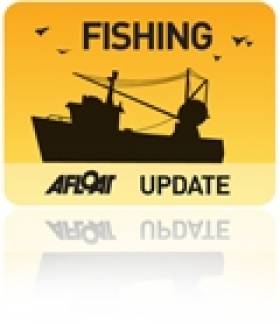Displaying items by tag: Marine Minister Simon Coveney
Sustainability of Fish Stocks Improving Says Minister
#Fishing - Dr Peter Heffernan, CEO of the Marine Institute, presented the Minister for the Marine Simon Coveney with The 2012 Stock Book ahead of the EU Fisheries Council negotiations next week, noting an improvement in certain fish stocks with a higher number of stocks sustainably fished in 2012 compared with 2011 - as Tom McSweeney writes about in his column last Friday.
The Stock Book gives an overview of 59 stocks from which Ireland has an EU quota allocation and will be used to inform discussions and decisions on Total Allowable Catches (TACs) fishing quotas for 2013. TACs and quotas will be decided at the December EU Fisheries Council on 18-20 December which will be attended by the minister, who has lately faced criticism over the proposed deep-sea salmon farm in Galway Bay.
Minister Coveney said: "I welcome the comprehensive review carried out by the Marine Institute showing the state of fish stocks that are of importance to Ireland. Of the 59 stocks in which Ireland has a share of the EU TAC, 42% are now fished sustainably compared to 36% in 2011. The state of the resource base in terms of the biomass, the population of mature fish in the stock, has also improved. The number of depleted stocks has declined from 12 to 8.
"It is good to see progress on delivering sustainable fishing. Further efforts are needed both in terms of setting TAC levels and also taking other measures such as reducing catches of juvenile fish and dealing with unacceptable levels of discards.
He added: "Having the latest scientific information at my fingertips is essential at the December council. My approach to the negotiations will be to utilise this science to ensure EU fishing policy secures the long term sustainability of the industry.
"The December Council negotiations must concentrate on achieving a more practical and pragmatic regime for the fishing industry, grounded in the scientific data available in the Stock Book.”
The Stock Book advice is developed using the latest available research, assessments and advice on the fisheries resource. Irish scientists collaborate with other international scientists at the International Council for the Exploration of the Seas (ICES).
“ICES is a key forum for Ireland where our scientists develop impartial scientific advice that meets best international standards,” said Dr Heffernan.
The Stock Book is presented annually to Department of Agriculture, Food and the Marine. The information is of vital importance in serving Ireland during the annual TAC negotiations at the various EU Council of Fisheries meetings, but principally at the December council meeting where the quotas for the following year are set.
It is also of interest to a wider audience, including the fishing industry, marine scientists, managers, environmental NGOs, third level institutes, financial institutions and those with an interest in the status and management of marine fisheries resources in the waters around Ireland.
The Stock Book has been published by the Marine Institute since 1993 and has evolved considerably in that time period. It continues to evolve in a changing fisheries advisory environment. The Stock Book is available electronically on the Marine Institute’s website HERE.





























































